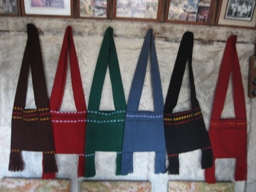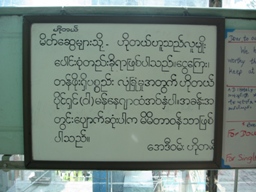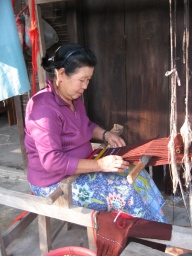
Shoulder Bags for Sale
 Shoulder Bags for Sale |
On the way down from the China border my car was stopped at several checkpoints. It wasn't a big hassle: I knew that travel along this stretch of road was restricted, so expected I would have to repeatedly show my papers to officials well beyond the border.
At one checkpoint we were detained for about half an hour before I finally asked my escort what the hold-up was. It turned out that this checkpoint was mainly concerned with collecting customs duties on restricted goods brought in from China. Nobody had even looked inside my knapsack, but we had an issue. The guide had brought contraband cargo in from China: a box of several printer toner cartridges.
I had paid a fair amount to hire the guide, car, and driver to allow me passage through the border and through the restricted areas of the Burma Road. All the same, I didn't really care that our reason for being held up was that the guide was making a little money on the side, bringing items in to re-sell at a profit. I found it interesting to observe, getting a glimpse of the situations people living in that area have to endure. The checkpoints are manned by government authorities. However, they are essentially nothing more than points from which to extort bribes. Whichever official happens to be in charge can arbitrarily declare any range of goods to be dutiable, prohibiting passage until taxes are paid. The afternoon we arrived, toner cartridges had just been added to the restricted list.
After turning back from the customs checkpoint and driving a short ways back in the direction from which we had come, we found there were plenty of local people who were willing to help us dodge the customs duties. Motorcycle traffic was allowed to pass through all of the checkpoints without customs inspection. Several locals were willing to play courier to get our goods around the checkpoints. We gave a small amount of money and a box of toner cartridges to each of three men, they sped off on motorbikes ahead of us. After passing through the final checkpoint we met at a local gas station to retrieve our contraband.
Lashio itself turned out to be not that interesting of a city. I was surprised by my mediocre initial impressions--not as I'd heard any great things about Lashio, but because it was the first city I visited in Myanmar. I presumed that being any place at all would excite me, given how long I'd wanted to make a trip to Myanmar. My impressions of Lashio were of a plain, small city offering not much reason to linger. I stayed for just one night, then took a bus along further south.
There was one thing which did make an impression upon arrival in Lashio: Myanmar is one of the few places where I cannot read at all. I'm not fully fluent in any language other than English, but can stutter enough through the writing of most other countries to get some meaning. Despite--or perhaps, because--the sounds and meaning of the Burmese script are completely lost on me, I found myself scrutinizing the signs around Lashio. Burmese looks cool: all round and super-googly. Being a former British colony I had expected there to be more English on signs.
 Googly Script on Guest House Message Board |
Moving on from Lashio the next day I took a cramped local bus to the next sizable town, Hsipaw. The ride was only a few hours so I didn't really mind the crowded conditions. I've been on longer and less comfortable journeys. The floor of this bus had been entirely covered entirely with sacks of flour, piled several bags deep along the floor. At least I was able to get a seat, though my knees rose up to the level of my chin.
In Hsipaw I stayed at the main place frequented by backpackers: Mr. Charles' Guest House. While on the road, the locations I stay vary. Sometimes I choose to avoid other travelers and the hotels which cater to them. Other times I stay at the very hotel given the best recommendation in my guidebook, knowing it will have many other people carrying the same guide. I figured this would be a good place to connect to ask questions about the other places around Myanmar: most other travelers would have already come through areas I haven't yet been. Additionally, the guidebook also made Mr. Charles' Guest House sound like it would be cleanest, cheapest, and friendliest place to stay in Hsipaw.
When checking in, the woman at reception was surprised that my port of entry was Muse. "You came here from China?" she looked at me curiously. The great majority of people do enter Myanmar via a flight into Rangoon, but I wondered why she was regarding me so--I surely wasn't the first guest at her hotel who had entered overland.
We got to talking, it turned out that she herself was ethnically Chinese. Despite being two generations removed from China (her grandfather had left Hunan for Burma) she had far better command of the language than I do: she grew up attending one of three Chinese schools that were in Hsipaw during her childhood. She wrote her Chinese name out in traditional characters. "But, you must call me by my nickname in Burmese, 'Htwe-Htwe'." Sure. I hadn't expected to use Chinese again until returning to China, so was happy to be able to communicate.
As opposed to Lashio, I'm finding myself curious to explore the area around Hsipaw. Hsipaw is a small city in a rural part of Myanmar with a few features that make it intriguing. It's in a nice setting, along the Irrawaddy, surrounded by pleasant hills and forests. This corner of the country is largely composed of ethnic minorities, distinct from the majority Burmese. Hsipaw is part of Shan State, the cultures I am exposed to here should be different from what follows down in Mandalay and Rangoon. The Shan people's language, culture, and traditions are much more similar to Thai than Burmese.
 Maybe I'm more open to exploration around Hsipaw than I was in Lashio
simply because I'm better rested: I slept really soundly last night. I
suspect my deep sleep might be connected with medication I've just begun
taking. I've begun taking a daily tablet of doxycycline to prevent
malaria. I'm not sure if it's doxycycline or one of the other anti-malarial
medications, but recall hearing that one of them is supposed to have
bizarre dreams as one of its side-effects. My dreams last night were vivid,
though not unusual, we'll see how my sleep goes on this trip.
Maybe I'm more open to exploration around Hsipaw than I was in Lashio
simply because I'm better rested: I slept really soundly last night. I
suspect my deep sleep might be connected with medication I've just begun
taking. I've begun taking a daily tablet of doxycycline to prevent
malaria. I'm not sure if it's doxycycline or one of the other anti-malarial
medications, but recall hearing that one of them is supposed to have
bizarre dreams as one of its side-effects. My dreams last night were vivid,
though not unusual, we'll see how my sleep goes on this trip.
My exposure to the local culture so far includes sampling a few traditional Shan dishes. Dinner last night was a pinkish, fermented rice topped with strips of tough bacon, all wrapped up in a banana leaf. Tonight it was noodle soup sprinkled with minced pork and vegetables, along with a side of barbecued pork and quail egg kebabs. Both meals were tasty, but neither terribly different from dishes I've tried other parts of Asia.
It seems like everybody I see on the streets of Hsipaw carries around a woven shoulder bag, today I set out to find a place to get one for myself. These bags are crafted entirely by hand, from the thread spun on a wheel to the actual weaving on a large loom. I came across a shop where they were being made and asked how much each bag was. The first asking price was 2300 kyats, less than $2 USD. I realize that people's labor and the cost of materials vary from country to country, but can't understand the economics of how something beautiful can be crafted by hand over several days labor and yet worth less than $2.